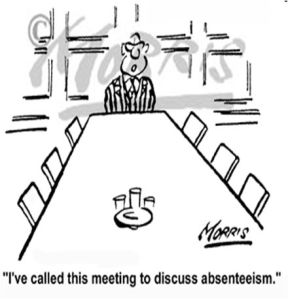Is absenteeism a problem you find difficult to handle?
On average, six out of ten employers don’t believe employees’ excuses when they ring in sick. One in three managers will check social media sites to see if the employee has posted any updates.
Figures show that in more than a fifth of the sick days taken, staff admitted they could have made it into work. Weather seems to play a huge part in sickness levels rising – whether it’s cold or hot, the absence excuses begin! Employers are clearly suspicious about unauthorised days taken off; perhaps not surprising given the varied excuses presented for absence…
Here are just a few of the more unique reasons given by employees for time off:
- A can of baked beans landed on my big toe
- My dog has had a big fright and I don’t want to leave him
- I’ve injured myself during sex
- I slipped on a coin
- My mum has died (this was the second time the person used this excuse)
- I am hallucinating
- I am stuck in my house because the door’s broken
- My new girlfriend bit me in a delicate place
- I burned my hand on the toaster
- The dog ate my shoes
- My fish is sick
- I swallowed white spirit
- My toe is trapped in the bath tap
- I’m in A&E as I got a clothes peg stuck on my tongue
- I drank too much and fell asleep on someone’s floor – I don’t know where I am
- My trousers split on the way to work
- I’m using a new contact lens solution and my eyes are watering
- I have a blocked nose
- I’ve had a hair dye disaster
- I’ve got a sore finger
The above excuses may be funny, but high levels of absence can have a huge negative impact on business – both from a financial perspective and operational perspective. It reduces the effectiveness of teamwork, reduces employee output, lowers morale, damages the company reputation and may result in lost business. It can also have a major negative impact on the employees who have to pick up the extra workload. How many times have you had the issue of kitchen staff ringing in sick and not being able to get a replacement? Or waiting staff ringing in sick leaving other members of staff trying to cover their area?
So what can be done to reduce absenteeism?
It’s important to start with the basics and implement a good absence management procedure, which will uncover the causes of absence and allow the employer to make necessary adjustments. The absence management procedure should include:
- Return to work interviews – this process makes it harder for employees to take time off without a proper reason and allows employers to understand if there are any genuine problems. Remember – it’s harder to lie to someone’s face than it is to lie over the phone!
- Bradford Factor procedure – this process allows employers to allocate “points” for absences. If an employee reaches a certain amount of points, they can be taken through the disciplinary procedure.
- Open communication – this is vital so both the employee and employer can talk honestly to each other. It’s much better to discuss potential issues at an early stage, rather than waiting until it spirals out of control.
The goal of a good absence management procedure is to reduce unauthorised and non-genuine absence to zero, whilst at the same time not penalising employees who have genuine absences.
Worryingly, many employers do not know how much absenteeism costs them. How much would your bottom line increase if absenteeism was not a problem?
Written by Liz Strama, HR Protected/ Endorsed by Stuart Baddiley, The Restaurant Inspectors.
HR Protected are a specialist HR company who work with clients to develop and implement strong and efficient HR systems. They have developed a cost-effective, easy to use Restaurant Sector Pack that contains all the main HR documents required to build a strong HR foundation and comply with current employment law. For further information, please visit their website www.hrprotected.co.uk
